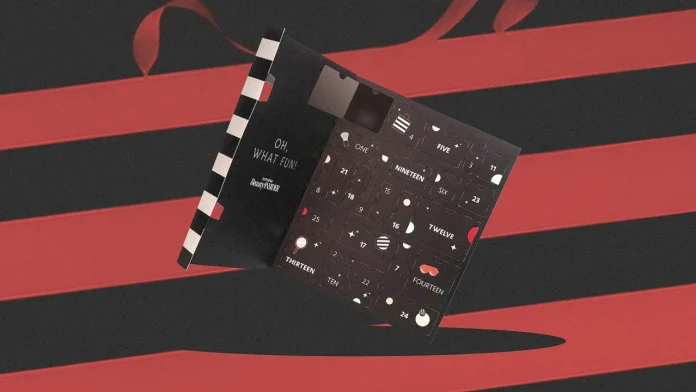Branded is a weekly column devoted to the intersection of marketing, business, design, and culture.
In recent years, advent calendars have become something of a gift to marketers: a feature of the holiday season that prods consumers to interact with a brand every day, and can get plenty of free attention if it’s good enough to make one of the proliferating best-of lists. But as some brands are learning, “attention” can be a lump of coal if a negative critique goes viral. And this year, one of Sephora’s advent calendars has some of its most loyal customers sounding downright angry.
Advent is a religious season, the period of anticipation in the run-up to Christmas Day, beginning the fourth Sunday before Christmas (which falls on December 1 this year). Advent calendars date back to the 1800s, and while details vary, the basic form involves a rectangular box or paper calendar with a scene, piece of scripture, or an object for each day, concealed by a door until that day. Sometimes, they contain gifts such as small toys or candy—a variation that obviously lends itself to secular use. (This development has not thrilled some religious observers.)
Brand-specific advent calendars aren’t new—apparently Cadbury had one as early as 1971—but now they serve as glorified (often premium-priced) sample packs in practically every category you can think of: whiskey, pet treats, tea, Legos, skincare, fancy cheese—and this year, Wicked. They not only serve as a de facto brand sampler, maybe introducing regular customers to new products or flavors; but because they’re often lavishly designed, they make for popular gifts that may lead to brand-new customers. (And in a culture of self care, they also make for popular self-gifting.)
Plus, in the age of “unboxing” videos on YouTube, TikTok, and nearly every other platform, they’ve really taken off. For content creators, the process of opening as many as 25 little doors (there are also many 12-day versions) concealing products to coo over or shrug at is a potential attention-capture bonanza. Consumers seem increasingly on board: Research last year from data firm CivicScience found that 22% of U.S. adults and 38% of Gen Zers were interested in advent calendars; and marketing agency Empower noted a 90% increase in consumer interest in the category since 2020. That can pay off for a brand.
Or not. Social media mentions aren’t always positive, and Empower points to several examples of backlash against brands (including Chanel and Dior) that, in recent years, offered advent calendars, which were deemed too pricey for what they delivered. It’s not just high-end brands: In the U.K., some buyers of a 10-pound (about $12.50) Walkers chips calendar complained on social media about its price point and “terrible” selection.
@theheauxmentorofficial Opening my @sephora advent calendar that I used 2500 beauty insider points for #adventcalendar #sephora #makeup #skincare #beautyinsider ♬ Jazz masterpiece "As time goes by" covered by a Jazz violinist by profession(962408) – ricca
Arguably, the most viral and buzzed-about advent calendar of 2024 is from Sephora—specifically the advent calendar available only to members of its Beauty Insider frequent-shopper program, for 2,500 points. (In general, members get one point for each dollar they spend at Sephora.) And the buzz isn’t so good. “This is the worst advent calendar I’ve ever seen,” declared beauty influencer Alexandria Ryan, toward the end of a half-hour video roasting item after item (mostly beauty application tools and things like scrunchies and hair clips), dismissing many as Dollar Tree-quality. “Offensive,” she summarized.
Ryan, who has about a half-million followers on YouTube, reviews lots of advent calendars and can be a tough and snarky critic; she has picked on Sephora before. But she’s definitely not alone here. More remarkable than standard dunking are examples like this three-video series from a TikToker who starts out bubbly and excited and becomes steadily, but palpably, more disappointed as she opens the next door. “I was expecting makeup, skincare,” she says, puzzling over an item she can’t identify. “If you like trinkets and knickknacks, this would be right up your alley.” (The last straw appears to be a pair of Sephora socks in the “grippy” style of hospital socks. “I’m triggered,” she says.)
Sephora did not respond to email from Fast Company, but comments on its community comment page suggest it has refunded at least some loyalty points to some customers who have complained. Meanwhile, others of the brand’s advent calendars this year do have fans, particularly its $98 “premium” advent calendar.
But the lesson here isn’t particular to a single brand; it’s a cautionary reminder that consumers have expectations, and a brand’s biggest fans can be its most aggrieved critics. Jumping into the advent calendar phenomenon sounds like an easy win—until shoppers (with their own fans) suspect they’re being exploited. That’s all it takes for the holiday spirit to go full Grinch.


